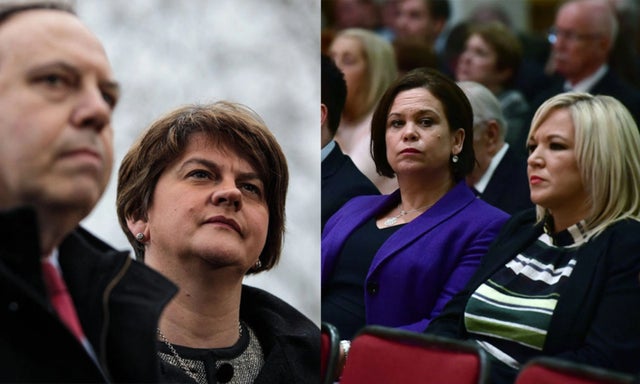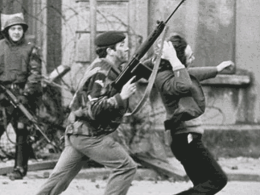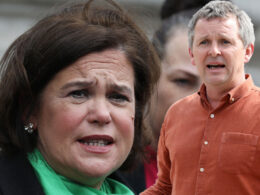by Daniel Waldron
Almost exactly three years after its collapse in the wake of the Renewable Heat Incentive (RHI) scandal, the Northern Ireland Assembly reconvened on Saturday 11th January and elected a new Executive. This followed an agreement between the DUP, Sinn Féin and the British and Irish governments, entitled ‘New Decade, New Approach’. Speaking after talks with the party leaders, Boris Johnson said he could see, not Tony Blair’s ‘hand of history’, but “the hand of the future beckoning us forward.” In reality, the deal is a case of déjà vu. Like its predecessor ‘agreements’, it fudges the key contentious and divisive issues – storing up instability for the future – while recommitting to a neo-liberal vision of cuts and privatisation, albeit with some window-dressing promises of investment and concessions.
The key factor which pushed the main parties back into the Stormont institutions was growing public anger at the ongoing deadlock – during which Assembly members continued to be paid – while health, education and other public services slipped deeper and deeper into crisis. Northern Ireland has the longest health waiting lists in the UK, with a staggering one in six of the population currently waiting for a hospital appointment, while the Royal College of Surgeons has said parts of the NHS here are at “the point of collapse”. Meanwhile, schools are under huge financial pressure, with even basics like toilet roll having to be donated by staff and parents.
This anger – as well as issues around Brexit – was reflected in the recent general election result, with both the DUP and Sinn Féin seeing their share of the vote fall. However, it was also crystallised through the strikes of tens of thousands of health workers, demanding equal pay with their colleagues in Britain – a parity broken by the DUP’s Jim Wells in 2014 and not restored by subsequent Health Ministers, including Sinn Féin’s Michelle O’Neill. The strikers also demanded urgent action to tackle understaffing in the NHS, with 7,000 vacancies currently open, including 3,000 nursing positions. This campaign has garnered overwhelming public support. Faced with the prospect of a fresh Assembly election where they would likely be punished further if the impasse continued, the DUP and Sinn Féin felt it was in their best interests to do a deal. This shows the impact which united working-class struggle can have.
Health crisis and workers’ struggle
The agreement commits the new Executive to ‘resolve’ the issues underlying the health strikes and also ongoing industrial action in education. The British government has offered an extra £1 billion to address these and other questions, although Sinn Féin Finance Minister Conor Murphy has said this falls “way short” of what is necessary and accused Johnson & Co of acting in “bad faith”, which could create an immediate impasse.
The new Health Minister, Robin Swann of the UUP – who, along with the SDLP, have left the ‘opposition benches’ and retaken their seats at the Executive table – has made an offer to health workers which would restore parity with English staff. The leaderships of Unison and the Royal College of Nursing (RCN) have suspended further planned strikes and announced plans to ballot their members on the deal.
Socialist Party members in health have argued that parity should be with Scottish workers – the highest paid – as a step towards levelling up across the UK. Also, nothing of substance has been offered with regard to tackling staff shortages, beyond an agreement to create 900 additional nursing and midwifery undergraduate places over the next three years – meaning 300 extra staff would be trained three years from now, less than 10% of what is needed immediately. This offer comes alongside a restated commitment to ‘restructure’ the NHS here, as envisaged in reports like Bengoa – that means further inappropriate centralisation of services, cuts, outsourcing and privatisation, all the more ominous with Boris Johnson now in power and eyeing a free-trade deal with the United States. A similar process is to take place in education.
While the new offer represents a step forward and reflects the pressure the strikes have placed on the politicians, continued determined and united action can win further concessions and send a warning that fresh attacks on our NHS and other services will be resisted tooth and nail. The Socialist Party advises Unison and RCN members to reject this deal and calls on NIPSA and Unite to stand firm and fight for more.
Austerity continues
There is no commitment in the deal to address the demands for pay justice of civil servants also engaged in industrial action, or of public sector workers more broadly. Instead, there is talk of further “reform” of the civil service and “rationalisation” of arms-length bodies – that is, job cuts and outsourcing – as part of the neo-liberal project of ‘rebalancing’ the economy in favour of the private sector. This will only enrage civil servants due to strike on 24th January, who should draw confidence from the impact of the health strikes. It remains to be seen if the re-established Executive will seek to use its powers to cut corporation tax – lobbied for by the DUP and Sinn Féin – which would be paid for through further cuts to our public services.
Already, the possibility of introducing domestic water charges – a prerequisite for full privatisation of the service – has been mooted by the DUP’s Edwin Poots and Alliance leader Naomi Long as a potential string attached to additional funding by the British government. If moves are made in this direction, it should be resisted through a campaign of mass non-payment, alongside trade union action, which saw off this threat in the past here and defeated similar regressive taxes in the South. The fact that the leaders of both the DUP and Sinn Féin felt the need to distance themselves from the comments of their Executive colleagues shows they are nervous about going down this route, which would lead to a confrontation with working-class communities.
The ‘mitigations’ package agreed after the DUP, Sinn Féin and Alliance voted to give the Tories the power to implement their welfare ‘reform’ programme here is to be extended beyond the previous cut-off point of March this year, which would have created “an unprecedented crisis in terms of child poverty, hunger, debt, rent arrears and mass evictions”, according to Professor Eileen Evason. The mitigations have given some protections to existing claimants, although the cuts have already cost many families thousands of pounds and driven some into desperate situations, leading to an increase in housing precarity and reliance on food banks. There is no guarantee that these limited measures will be secured indefinitely, never mind a reversal of these draconian benefit cuts.
Rights won in struggle
While the introduction of same-sex marriage by Westminster has effectively been accepted by the DUP as a fait accompli, we could see attempts to roll back on the recent decriminalisation of abortion. These victories were not simply handed down by benevolent MPs but were products of grassroots struggle. None of the main parties support the right to choose. Key figures in Sinn Féin have signalled their preparedness to reach a compromise on this issue. In a recent interview, Conor Murphy said his party supports abortion only “under very limited circumstances”, reflecting the hypocrisy of Sinn Féin, who were forced to posture as pro-choice in the context of the Southern repeal referendum because of the overwhelming demand for change. Anything less than access to abortion on the NHS in Northern Ireland for everyone who needs it must be met with mass protests and civil disobedience to secure full reproductive rights.
There was much speculation in advance of the deal about reform of the Petition of Concern mechanism, which means a piece of legislation requires backing from a majority of both Unionist and nationalist MLAs in order to pass, if 30 MLAs sign a petition to that effect. This was originally intended as a safeguard for the interests of the minority community around contentious issues, but was abused by the DUP to block marriage equality and also shield Ministers from criticism. The agreement stipulates that a Petition of Concern can no longer be used with regard to the role of Ministers and will now require support from representatives from at least two parties – academic, given that no party has 30 MLAs since the number of seats was reduced in 2017. Other than that, there is only a vague promise that parties will use it only for “its intended purpose” and “in the most exceptional circumstances and as a last resort.” This is in no way binding and the mechanism can again become a source of paralysis and a means to block further progress on LGBTQ rights and other questions.
The agreement commits the Executive to introduce carbon emissions targets in line with the Paris Climate Accord. However, the appointment of Edwin Poots of the DUP – a party with a long history of climate change scepticism – as Minister for the Environment will raise doubts about the seriousness of this commitment. Exploration licences for oil, gas and minerals were granted across large swathes of Northern Ireland last year. This poses the threat of the introduction of fracking – which even the Tory government was recently forced to suspend in England due to earthquakes being caused – as well as other environmentally destructive extractive industries, which Poots and the Executive would have the final say on. Community campaigns are already resisting these industries in a number of areas.
Working-class struggle can win victories
The absence of Stormont ministers over the last three years, and the lack of a generalised movement against austerity and poverty across the UK, has acted to dampen the potential for industrial struggle in the public sector in Northern Ireland, with workers seeing no clear pressure points for action. That dam finally burst in recent months, with the development of battles in the civil service and particularly in health. This is reflected in “New Decade, New Approach”, which pledges to improve workers’ rights, including banning zero-hour contracts, something previous Executives refused to do. The re-establishment of the Executive provides an opportunity for the trade union movement to now go on the offensive on pay, jobs, workers’ rights, investment in public services and other issues, to secure victories for the working-class from a devolved government which is clearly susceptible to pressure from below.
In the past, the movement’s leadership has sought to prop up the Stormont institutions, including corralling workers’ struggles at crucial junctures, seeing themselves as being in a form of ‘social partnership’ with the pro-capitalist and sectarian local parties. This has delivered only deepening poverty and misery, while allowing sectarian tensions to develop. That approach must go and be replaced with a strategy of using the collective power of organised workers and the wider working class to take on the Stormont politicians and the Tories in the interests of our class.
Continued sectarian polarisation
Sinn Féin’s Michelle O’Neill – now Deputy First Minister – said in the Assembly chamber she hoped the deal would deliver “a stable power-sharing coalition” with “no surprises”. However, the new Executive will likely have a limited honeymoon period and faces clear pitfalls of a sectarian character going forward. A return to the relative stability of 2007-2017 is essentially ruled out.
While it does nothing to fundamentally address the economic and social questions facing ordinary people, neither does the deal create solutions to the divisive and contentious questions relating to culture, identity and the legacy of the conflict. Instead, in time-honoured tradition, it simply kicks the substantive issues further down the road, where they wait to create fresh instability in the institutions when they finally have to be faced.
Language rights
The key remaining stumbling block in the negotiations to date had been the question of Irish language rights, with Sinn Féin demanding a stand-alone act which the DUP declared to be unacceptable. The new agreement – via three separate amendments to the Northern Ireland Act – makes some symbolic changes. Irish and Ulster Scots are to be given ‘official status’, with translation services introduced to make all government documents available in both languages, as well as the simultaneous translation of Stormont proceedings. Centuries-old legislation prohibiting the use of Irish in courts is to be repealed.
An Irish language commissioner will be appointed – alongside one for Ulster Scots, and the establishment of an Office of Identity and Cultural Expression – who will be responsible for drafting guidelines of ‘best practice’. This would presumably include what provisions should be put in place to allow Irish speakers to interact with public bodies and access services in the language, as well as signage. The commissioner’s guidelines would require approval from both the First and Deputy First Ministers, meaning the DUP have an effective veto on the proposals. This is a fresh pitfall awaiting the new Executive in the near future.
In the wake of Stormont’s collapse, both the main parties sought to polarise opinions around the issue of Irish language rights, turning it into a sectarian football in their cynical game. Opinion polls showed a large majority of nationalists felt Sinn Féin should not go back into Stormont without an Irish Language Act while, conversely, the majority of Unionists opposed the DUP agreeing to one. These sentiments prevented a deal being done in early 2018, when the DUP leadership felt unable to sell a draft agreement to their base. Both parties will remain under pressure on the issue. Irish language groups have welcomed steps forward but said the agreement does not go far enough in terms of guaranteeing rights, while the Orange Order has opposed what is contained in the deal, seeing it as disproportionately elevating Irish. Future proposed guidelines have the potential to provoke a renewed crisis at Stormont.
The Socialist Party recognises the Irish language and Ulster Scots as component parts of our shared cultural heritage in the north of Ireland which are not the property of any one community or party. We support the rights of everyone to learn, speak and access public services in these languages, if they so choose, with the necessary funding being put in place. However, we also recognise the sensitivities around language due to the cynical abuse of cultural expression by sectarian forces on both sides over decades, and respect the rights of individuals and communities not to have languages foisted upon them against their will.
Solutions on legacy issues?
Similarly, on issues connected with the legacy of the Troubles, limited measures have been agreed but the key questions have been left open. There is a commitment that the British government will move ahead with a compensation scheme for victims of the conflict, although who qualifies as a victim remains contentious. Five years after it was first agreed, a new Historical Investigations Unit is to be established alongside other related bodies, tasked with looking into the events of the Troubles. Meanwhile, Unionists have secured an Armed Forces Commissioner to represent the interests of former soldiers and their families.
However, the legitimate demands from victims of state violence – predominantly meted out against the Catholic community – for truth and justice will continue to clash with the perception among many Protestants that there is a one-sided persecution of former members of the state forces, while members of the IRA and other paramilitaries are let off the hook for their actions during the Troubles. The prosecution of ‘Soldier F’ for his role in Bloody Sunday has already provoked loyalist protests. On the other hand, any attempt by the British state to protect those like Soldier F or, more importantly, their superiors – as is indicated by the Conservatives’ manifesto – will likewise provoke justified anger from those communities affected. In her position as new Minister for Justice, Alliance leader Naomi Long will be compelled to balance between these countervailing pressures and can come under fire from her Executive colleagues on both sides, with the potential for heightened clashes to pull the political institutions apart.
Anti-sectarian alternative needed
More generally, the new Executive sits atop a volatile foundation, with demographic changes and related sectarian pressures – which the main parties themselves feed into – threatening to again break open the ground beneath its feet. The Unionist majority is now seriously under question, due to the relative growth of the Catholic community in recent decades, with more nationalist than Unionist MPs being elected in December for the first time in the history of the Northern Irish state. Brexit has acted to accelerate and sharper processes which were already underway. Sinn Féin’s demand for a border poll in the near future is gaining more traction among the Catholic community, who fear that loss of EU membership can potentially see rights and safeguards undermined, particularly under the reactionary Johnson government.
Meanwhile, there is a growing sense of isolation and insecurity among many Protestants, fearing the break-up of the Union – with the rise in support for Scottish nationalism – and feeling betrayed by Johnson’s Brexit deal which will put a regulatory border down the Irish Sea. Fear of being pushed into a capitalist united Ireland against their will can provoke a backlash from sections of the Protestant community in the coming period.
Even largely symbolic issues which emerge can become explosive proxy battles for this wider sectarian tug-of-war between the communities. The main parties – basing themselves upon these opposed aspirations and identities – will not be able to indefinitely walk the tightrope of maintaining sectarian division while also maintaining the power-sharing institutions. New safeguards and bodies aimed at creating failsafes during future crises will not be able to overcome this fundamental contradiction.
DUP leader and First Minister Arlene Foster has said, “we cannot allow society to drift backwards and allow divisions to grow.” But this is precisely what has happened and will tend to continue under the stewardship of the sectarian parties. As the Socialist Party has argued from the outset of the ‘peace process’, no lasting solutions to the contentious issues which divide our communities can ever be achieved while politics remains dominated by forces which have a vested interest in maintaining a sectarian carve-up. When faced with united class opposition, too, their default response is to whip up sectarian tensions, as we have seen time and again. These forces are ultimately leading us towards the threat of renewed conflict, which would be a nightmare for ordinary people.
While the growth of Alliance at the general election reflects an important section of people looking for an alternative to the dead-end of Orange and Green, their pro-capitalist policies offer no solutions to the poverty and alienation in working-class communities which fans the flames of sectarianism. They can be pushed back decisively when sectarian issues again reassert themselves.
The only force capable of genuinely breaking down the sectarian barriers between our communities is the trade union and labour movement, uniting working-class people around our common interests and in opposition to the Green and Orange Tories. The unity in struggle of workers from all backgrounds on the health picket lines, and the huge support they received from across the divide, gives a sense of what is possible. This class solidarity must be given expression, not just industrially, but also politically. We need a mass, anti-sectarian party based on workers and young people which offers socialist policies to address the misery facing working-class people, but which also strives to articulate independent solutions to the issues which divide our communities, based upon mutual respect and compromise.
The restored Executive and its neo-liberal programme is incapable of addressing the economic and social problems facing working-class people. It will face united struggles of workers and young people on a whole range of issues, but it will also be buffeted by sectarian headwinds. Its future is inherently precarious. The key question is whether it is the forces of sectarian reaction which come to the fore in the next period, of whether a class alternative can be built which can fundamentally challenge the sectarian edifice of society here and advance the struggle for a socialist future free from poverty and division.












